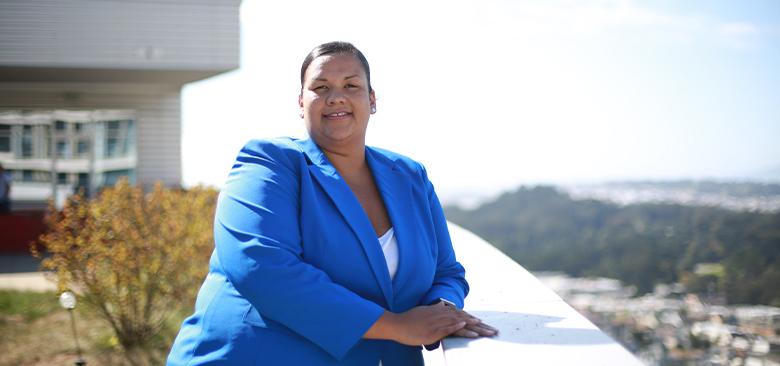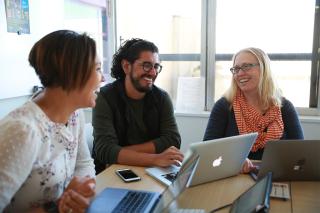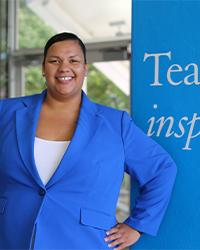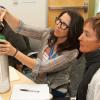
Janelle Charles has leveraged the resources and support from the School of Nursing's FirstGenRN program and is on track for a rewarding career. (Photos by Mark Wooding)
UCSF Opens Doors to Health Care Careers for First-Gen Students
While growing up in San Francisco, Janelle Charles was a star student, ultimately earning scholarship offers to multiple universities – heady stuff for someone who would be the first in her family to truly attend college (her father attended briefly). Having spent her entire life in the city’s Bayview-Hunters Point neighborhood, Charles decided to leap into the unknown, choosing Bowdoin College, a small, liberal arts college in Brunswick, Maine.
There – as many students who are the first in their families to graduate from college do – she struggled. Because first-generation students are more likely to be members of underrepresented minority groups or come from disadvantaged socioeconomic backgrounds, they can become isolated, unaccustomed to the social and academic routines that are second nature to their peers whose parents attended college. The isolation can be exacerbated by the fact that first-gen students rarely see faces that look like them and struggle to find peers who might also be first-gen. In addition, financial demands might require first-gen students to work significant hours during their college years, forcing many to take a longer time to graduate or to leave school for good.
Charles checks all of those boxes and did leave Bowdoin for a stretch. She too might have permanently abandoned her college dreams, but her ability to gather herself and graduate in 2008 speaks to another defining characteristic of many first-gen students: grit. It’s one of many strengths that the FirstGenRN program at UCSF School of Nursing has made a point of emphasizing. Now a student in the Master’s Entry Program in Nursing (MEPN) program at the School, in the Adult-Gerontology Primary Care Nurse Practitioner-Occupational & Environmental Health specialty, Charles appreciates the emphasis on her strengths as well as the program’s many support services.
“FirstGenRN has been important,” she says. “It provides a social space to identify with my peers and talk about our challenges. It also has professional development workshops that we need to further our careers after we graduate.”
Leading the Way in First-Gen Graduate Education
The School’s FirstGenRN program is part of the broader UCSF First Generation Support Services program, which has rapidly become a national leader in addressing the needs of first-gen students in graduate school, particularly in health sciences. In June 2019, the Center for First-Generation Student Success recognized UCSF as a First Forward Institution, an acknowledgement of the university’s commitment to first-gen students.
“This was especially meaningful, because most of the other schools [that received the First Forward designation] are focused on the undergraduate experience,” says faculty member  Laura Wagner, right, who began the FirstGenRN program with student Frank Molina and Alece Alderson, acting assistant vice chancellor for student life. Laura Wagner, who began the FirstGenRN program at the School of Nursing through a 2017 UCSF Innovations Funding for Education Grant. “We are one of, if not the only, institution focused on graduate education in health sciences.”
Laura Wagner, right, who began the FirstGenRN program with student Frank Molina and Alece Alderson, acting assistant vice chancellor for student life. Laura Wagner, who began the FirstGenRN program at the School of Nursing through a 2017 UCSF Innovations Funding for Education Grant. “We are one of, if not the only, institution focused on graduate education in health sciences.”
“[Many other graduate institutions nationwide] are looking to us for how we're supporting our first-gen students,” says Alece Alderson, acting assistant vice chancellor for Student Life. Alderson says the emphasis on first-gen students’ many strengths extends to the insights they bring to health care’s next generation. “Many of these students, for example, return to marginalized communities to work, bringing with them a deep and heartfelt commitment to and understanding of those communities,” she says.
“There’s been so much research on race, social and cultural concordance between providers and their patients with health care outcomes that it makes sense to have as many first-gen students as possible,” says Wagner, who is first-gen herself and is quick to note that the diversity of first-gen students goes beyond race and ethnicity. “Every one of us has had a different way of working our way through college and one of things I like about working with this group is our diversity. Every student is different.”
She and Alderson note that the emphasis on strengths, however, does not discount the many barriers these students face at UCSF. “Many have to move here from far away and this is an expensive, fast-paced city; it takes them out of their comfort zone,” says Alderson. “Our university gives them a safe place to work through their insecurities – to help them overcome so-called ‘impostor syndrome’ and recognize the value of the experiences they do bring to the table.”
For UCSF’s First Generation program, creating a safe place involves three primary pieces:
- Making first-gen students more visible to each other and to their campus peers and faculty, via posters and lapel pins aimed at instilling pride in first-gen accomplishments and a sense of community.
- Connecting first-gen students with peer, faculty, staff and alumni mentors, most of whom are first-gen, through its mentorship program.
- Creating events and workshops that further build community and help first-gen students develop the skills necessary for a successful academic experience and health care career. The workshops include everything from communication with mentors and advisors, financial management and scientific writing through building a career action plan and how to conduct salary negotiations.
In addition, the First Generation program conducts workshops for faculty mentors on how best to work with first-gen students and has created a downloadable mentor-mentee resource guide.
“We are also helping some of our other faculty who are not first-gen understand how to be more sensitive to these students’ challenges,” says Alderson.
Much of the work complements that of other campus groups who support traditionally underrepresented students. “We have to listen to what may be salient, because the traditional boxes don’t always apply,” says Alderson.
Bringing Leadership, Expertise to Other Programs
As further evidence of UCSF’s innovative leadership in this area, in December 2018 Wagner received a $250,000, three-year grant from the California Wellness Foundation to implement and evaluate FirstGenRN programs in three California nursing schools: UCSF School of Nursing, California State University East Bay and Hartnell College in Monterey. All offer nursing licensure programs to a high proportion of under-represented minority, first-gen students.
“Part of what we’re doing is connecting students to resources at each of these schools, whether it’s for help with time management, mental health services or programs like CalFresh for those students who are food insecure,” says Wagner.
The California Wellness grant is also aimed at creating awareness among faculty about how to help first-gen students connect with resources, both during and after their time at the school.
Finally, says Wagner, “We are collecting some qualitative and quantitative data to help us better evaluate what is working and what is not, including admissions and completion metrics.”
Successes and Challenges
Wagner is also in the midst of studying six years of admissions data across all programs at the UCSF School of Nursing since the university started collecting data on parents’ highest level of education in 2012. She is preparing a paper that describes both the differences in admission rates, as well as the encouraging acceptance rates for first-gen students in most programs.
She says the strong acceptance rates may be due, in part to the fact that, “We are one of a growing number of universities in the country to abolish use of the GRE in favor of a more holistic admission process, because we recognize that first-gen students typically aren’t trained to fit easily into traditional academic environments.”
To further level the playing field, the School’s student affairs office sends all first-gen applicants anticipatory guidance to strengthen their applications. Once here, there are multiple supports to help students succeed. “That will be the second phase of our analysis, to see if we successfully help students avoid leaving school or taking longer to finish,” says Wagner.
Aiming for an Inaugural First-Gen Health Professions Conference
To build on all of their work to date, Wagner and Alderson are in the midst of organizing and hosting a first-of-its-kind national conference on working with first-gen graduate students in the health care field. The target date is the fall of 2020.
“And because all of the first-gen literature so far is on undergraduate education, we want to start publishing research on grad students, so we can highlight the different issues they face,” says Alderson.
That’s important, says Wagner, because attracting and retaining first-gen students to health care professions is central to the goal of creating a more diverse health care workforce. “First-gen programs make a difference,” she says. “It takes a lot less work to prevent a difficult situation for these students if we provide supports from the beginning.”

 When she returned to Bowdoin, she was better prepared. She actively used the school’s support resources and wound up graduating in 2008, completing a dual major of Latin American studies and Spanish. Her undergraduate years included a study abroad program in the Dominican Republic where friendships with medical students there spurred her to begin thinking about health care as a career. “Until that point, I’d never really thought much beyond college,” she says. “I didn’t know about things like shadowing and informational interviews.”
When she returned to Bowdoin, she was better prepared. She actively used the school’s support resources and wound up graduating in 2008, completing a dual major of Latin American studies and Spanish. Her undergraduate years included a study abroad program in the Dominican Republic where friendships with medical students there spurred her to begin thinking about health care as a career. “Until that point, I’d never really thought much beyond college,” she says. “I didn’t know about things like shadowing and informational interviews.” 

